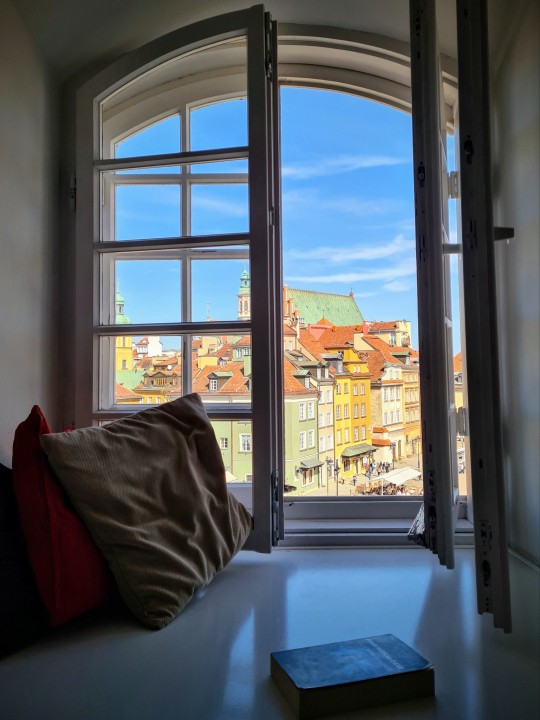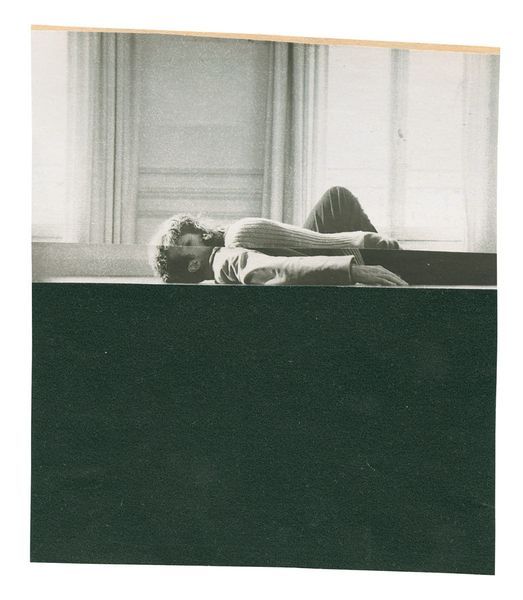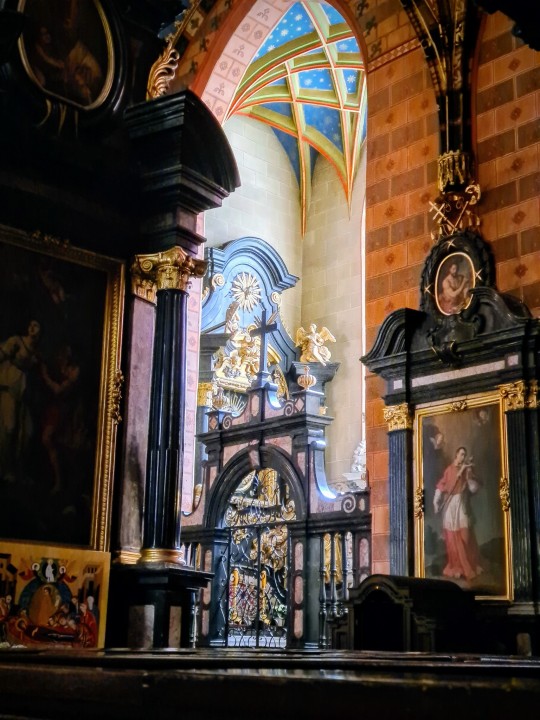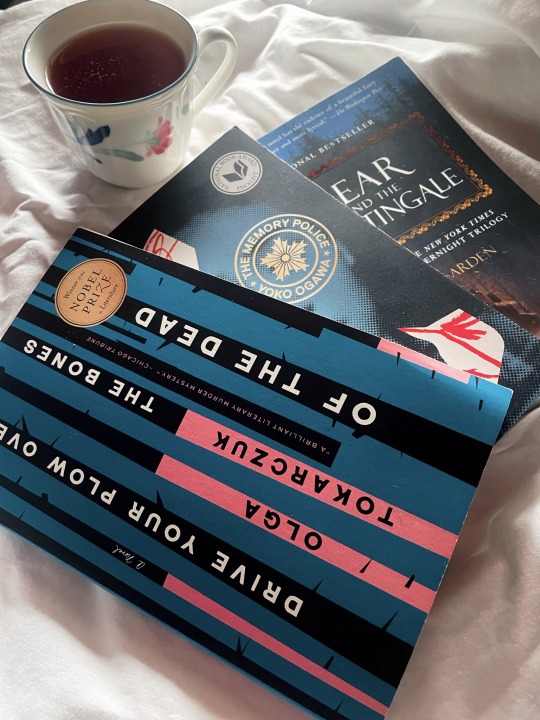#olga tokarczuk
Text
I do not know what so attracted me to him—those who say that certain souls recognize each other instantly and cling to one another inexplicably are right.
Olga Tokarczuk, The Books of Jacob, tr. Jennifer Croft
3K notes
·
View notes
Quote
That’s what I dislike most of all in people – cold irony. It’s a very cowardly attitude to mock or belittle everything, never be committed to anything, not feel tied to anything. Like an impotent man who can’t experience pleasure himself, but will do all he can to ruin it for others.
Olga Tokarczuk, Drive Your Plow Over the Bones of the Dead
667 notes
·
View notes
Text

The prison is not outside, but inside each of us. Perhaps we simply don't know how to live without it.
-- Olga Tokarczuk
(Warszawa, Poland)
#prison#inside#freedom#olga tokarczuk#travel photography#warsaw#warszawa#poland#window#view#book#bookblr#photography#quote#distance
241 notes
·
View notes
Text

Olga Tokarczuk, from “The Books of Jacob”, tr. Jennifer Croft, and originally published c. 2014.
83 notes
·
View notes
Text
It is at Dusk that the most interesting things occur, for that is when simple differences fade away. I could live in everlasting Dusk.
Olga Tokarczuk, from Drive Your Plow Over the Bones of the Dead (tr. from the Polish by Antonia Lloyd-Jones)
2K notes
·
View notes
Text
Nosotros no nos encontrábamos
no nos buscábamos en los huertos con una manzana
entre los murmullos de la seda en naves de las iglesias
Siempre estuvimos uno dentro del otro
en el cuerpo de dios de doble cara
en las pinturas medievales de los sótanos de los museos
y en las fotos de nuestros padres
inocentes como papel
Nosotros -maestros de cruzarnos-
solo permanecimos uno frente al otro
y en espejos de la piel nos reflejamos enteros
el mundo se alejó en silencio y con el dedo en los labios
los bosques echaron raíces en el suelo
las ciudades guiadas por el olfato encontraron lugares
donde los hombres las construían infinitamente
los ríos entraron en los mares como los trenes en las estaciones
los montes inasibles cuajaron en las cuevas
Si yo soy un monte
tú eres una cueva dentro de mí
lugar en el monte donde no hay monte
lugar dentro de mí donde no estoy.
_ Olga Tokarczuk
Trad. Ada Trzeciakowska.
_ Katrien de Blauwer

76 notes
·
View notes
Text
« Tenderness is the art of personifying, of sharing feelings, and thus endlessly discovering similarities. Creating stories means constantly bringing things to life, giving an existence to all the tiny pieces of the world that are represented by human experiences [...]. Tenderness personalizes everything to which it relates, making it possible to give it a voice, to give it the space and the time to come into existence, and to be expressed. It is thanks to tenderness that the teapot starts to talk.
Tenderness is the most modest form of love. [...] It appears wherever we take a close and careful look at another being, at something that is not our “self”. Tenderness is spontaneous and disinterested; it goes far beyond empathetic fellow feeling. Instead it is the conscious, though perhaps slightly melancholy, common sharing of fate. Tenderness is deep emotional concern about another being, its fragility, its unique nature, and its lack of immunity to suffering and the effects of time. Tenderness perceives the bonds that connect us, the similarities and sameness between us. It is a way of looking that shows the world as being alive, living, interconnected, cooperating with, and codependent on itself.
Literature is built on tenderness [...]. »
— Olga Tokarczuk in her Nobel speech, December 2019
1K notes
·
View notes
Text
Winter mornings are made of steel; they have a metallic taste and sharp edges. On a Wednesday in January, at seven in the morning, it’s plain to see that the world was not made for Man, and definitely not for his comfort or pleasure.
– Olga Tokarczuk, Drive Your Plow Over the Bones of the Dead (Fitzcarraldo Editions, September 12, 2018)
79 notes
·
View notes
Text
Tenderness is deep emotional concern about another being, its fragility, its unique nature, and its lack of immunity to suffering and the effects of time. Tenderness perceives the bonds that connect us, the similarities and sameness between us.
Olga Tokarczuk
100 notes
·
View notes
Text
The comet resembles a scythe aimed at humanity, a naked glistening blade that might slice off millions of heads at any moment, and not only the ones on the craned necks in Ivanie, but alco city dwellers' heads, Lwów heads, Kraków heads--even royal heads. There is no doubt it is a sign of the end of the world, a harbinger of angels rolling up the whole show like a rug. The play is evidently over, armies of archangels already gathering on the horizon. If you pay attention, you can hear the clanking of the angelic arsenal.
The Books of Jacob, Olga Tokarczuk
60 notes
·
View notes
Text
“Al ser humano hay que enseñarle que puede influir en su vida y en el mundo entero. Que si da un golpe en el suelo, temblarán los tronos. Usted dice: la ley hay que quebrantarla de manera secreta, en las alcobas, y por fuera fingir que se la obedece. ¡Quebrantar la ley en dormitorios y alcobas! –Thomas presiente que se ha excedido en la crítica a su tío, y baja un poco el tono–. Yo digo lo contrario: cuando la ley es injusta y constituye una desgracia para la gente, hay que cambiarla, actuar a cara descubierta, audazmente, sin transigir en nada.”
Los libros de Jacob / Tokarczuk, O. (2023)
#lit#frases#literatura#prose#books#prosa en español#words#diario#olga tokarczuk#escritores#escrito#escrituras#escritos#palabra#palabras#cita#citas#fragmento#fragmentos#ley
19 notes
·
View notes
Text
Between the heart and the tongue lies an abyss [...]
Olga Tokarczuk, The Books of Jacob, tr. Jennifer Croft
710 notes
·
View notes
Quote
People – who themselves are in fact a process – are afraid of whatever is impermanent and always changing, which is why they have invented something that doesn’t exist – invariability, and recognised that whatever is eternal and unchanging is perfect. So they have ascribed invariability to God, and that was how they lost the ability to understand Him.
Olga Tokarczuk, Primeval and Other Times
164 notes
·
View notes
Text

Perhaps that’s the whole point of prayer – to think to yourself in peace, to want nothing, to ask for nothing, but simply to sort out your own mind. That should be enough.
-- Olga Tokarczuk
(Krakow, Poland)
#prayer#peace#sort it out#olga tokarczuk#travel photography#krakow#altar#poland#church#thoughts#quote
130 notes
·
View notes
Text

Olga Tokarczuk, from “The Books of Jacob”, tr. Jennifer Croft, and originally published c. 2014.
47 notes
·
View notes
Text
A Blue Haul

#book haul#new books#yoko ogawa#olga tokarczuk#katherine arden#bookish#booklr#books#bookworm#books and reading#bookblr#literature#reading#bibliophile
45 notes
·
View notes